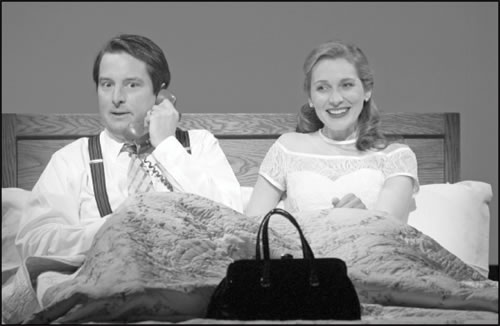By Scott Harrah
New life for one of Christopher Durang’s earliest and best works
THE MARRIAGE OF BETTE
AND BOO
Written by Christopher Durang
Directed by Walter Bobbie
Through Sept. 7
Laura Pels Theatre at the Harold and
Miriam Steinberg Center for Theatre
111 West 46th St.
212-719-1300, roundabouttheatre.org
Many consider this ultra-dark tragicomedy by prolific avant-garde playwright Christopher Durang to be among his finest works, and for good reason. Originally produced as a theatrical sketch when Durang was a student at Yale Drama School (and starring the great Meryl Streep back when she, too, was just a student) and later mounted at the Public Theater in 1985, “The Marriage of Bette and Boo” explored the absurdities and emotional heartbreak of family dysfunction long before it was commonplace. This is a show that was written decades before reality TV, tell-all books and Tony-winning stage dramas like “August: Osage County” depicted the American family as a deeply wounded entity in desperate need of nonstop psychological counseling.
The humor in “The Marriage of Bette and Boo” is not for the squeamish. Alcoholism and stillborn babies are two major themes that are mined for laughs, and such off-the-wall jokes were probably shocking when Durang originally penned the script, but seem almost tame by today’s standards.
As a play, “The Marriage of Bette and Boo” is merely a satirical series of 33 vignettes about the rise and subsequent deterioration of one upper-middle-class couple’s marriage over two decades. Because this is a comedy (well, sort of), audiences shouldn’t expect three-dimensional characters, but the cast’s performances are so exquisite that it doesn’t really matter.
Roundabout’s off-Broadway revival of the two-act show features a sublime cast of both comedy veterans and lesser-known actors. Bette (Kate Jennings Grant) is a good Catholic girl who marries the initially wholesome Boo (Christopher Evan Welch), hoping they will both have lots of kids together. Like most marriages, things don’t go as smoothly as planned as the years pass. Boo has a problem with alcohol, and Bette is only able to have one child, Matt (Charles Socarides), who doubles as narrator for the show. Bette’s dreams of having a large family are shattered when she gives birth to several stillborn babies— which, for absurdist comic effect, are flung unceremoniously to the floor by the doctor at the hospital to indicate that they didn’t make it. Grant is excellent as the emotionally battered Bette, portraying her as a woman with lots of optimism that is slowly stripped away by her husband’s alcoholism and her ongoing problems with fertility and reproduction.
Durang portrays most of the men in the story as grotesque caricatures, and the women as delicate, mentally dissipated creatures. Bette’s son Matt (Socarides)—who spends much of the play talking about the Thomas Hardy novels he’s reading at Dartmouth—is the only sane male in the story. Terry Beaver is often hysterical in dual roles as the lovably inane priest Father Donnally and the baby-dropping doctor. Adam LeFevre plays Bette’s father Paul Brennan as a buffoon who speaks in inaudible but very funny outbursts of gobbledygook. John Glover portrays Karl Hudlock, Boo’s father, as an insulting, despicable drunk who has nothing but contempt and an arsenal of cruel wisecracks for his long-suffering, timid wife Soot (Julie Hagerty of “Airplane” fame). There’s never any real explanation as to why she’s called Soot, other than the fact that her husband treats her like dirt for no logical reason.
One of the play’s standout performances is given by the marvelous Heather Burns (best known for her hilarious role as the goody-two-shoes, beauty-pageant contestant in “Miss Congeniality”). Burns plays Bette’s neurotic, overly apologetic sister Emily Brennan—a convent dropout who’s too mentally unstable to be a nun—with a comedic fervor that often steals the show. Zoe Lister-Jones is also superb as Bette’s other sister Joan, a dour, sarcastic smart-mouth who’s nothing like her siblings.
Walter Bobbie directs everyone with fluid timing, making the sometimes-jarring scene changes—from family scenes to the numerous oddball hospital settings—work. Playwright Christopher Durang often relies on shock value for humor and to make dramatic points, but he never really overdoes it. Although the narrative and characters come across as too cartoonish at times, “The Marriage of Bette and Boo” nonetheless evokes laughter, truths about family discord, and genuine sadness in all the right places.
Letters policy
Downtown Express welcomes letters to The Editor. They must include the writer’s first and last name, a phone number for confirmation purposes only, and any affiliation that relates directly to the letter’s subject matter. Letters should be less than 300 words. Downtown Express reserves the right to edit letters for space, clarity, civility or libel reasons. Letters should be e-mailed to news@DowntownExpress.com or can be mailed to 145 Sixth Ave., N.Y., N.Y. 10013.































